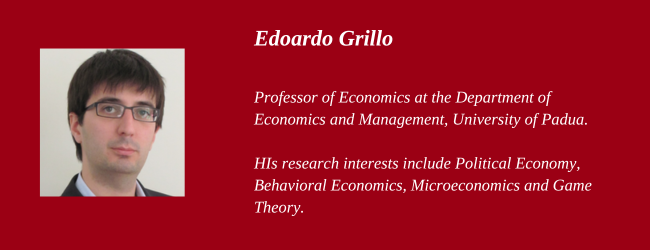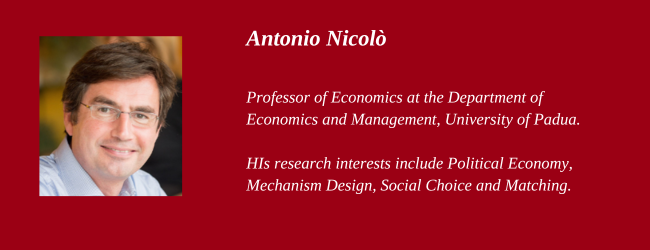Learning the hard way: Conflicts, sanctions and military aid
Suppose a country is threatening to attack another one. Both countries are uncertain about their relative military strength. If a conflict starts, countries learn about their strength from its outcome. Other countries might decide to get involved and, when they do, their involvement affects not only the odds of the two sides, but also what countries learn from the battlefield.
The recent article "Learning the hard way: Conflicts, sanctions and military aid" published in the Journal of Public Economics by Edoardo Grillo and Antonio Nicolò of the University of Padova explores the strategic intervention of third parties in conflicts. The authors analyze how the intervention of a third country with sanctions and military aid influences the outcome of a conflict and what the attacker learns concerning its own strength.
What are the main findings?
One important finding is that the involvement of a third country is not always a simple case of helping the country under attack. The involvement actually depends a lot on how strong the attacking country appears to be. The help offered might initially increase if the attacker seems stronger, as the third party tries to make the attacker lose and become less confident. However, if the attacker looks overwhelmingly powerful, the third party might reduce their involvement to avoid a risky and likely unsuccessful intervention, which would boost the attacker’s confidence.
Another important result is that a country that is really determined to defend itself is more likely to receive help. If the country being threatened shows a strong will to fight against the attacker, even without outside assistance, a third country is more inclined to step in and provide military aid.
Third-party involvement in conflicts is, thus, a complex game aimed at managing the confidence of potential aggressors and heavily influenced by both the perceived strength of the attacker and the determination of the defender.
How did the authors research these findings?
The authors developed a theoretical model to analyze the strategic interactions in international conflicts involving a potential attacker, a defender, and a third-party intervener. In their setting, countries are rational agents:they make strategic choices to maximize their expected payoffs. The model considers the uncertainty about the attacker's relative military strength, and how this uncertainty is updated based on the outcomes of conflict. By analyzing the incentives of these rational actors, the authors derived the equilibrium outcomes of their game. This involves identifying the strategies that each country would logically choose, given the potential actions and payoffs of the others, ultimately leading to conclusions about third-party intervention strategies, the use of military aid and sanctions, and the role of factors like defender resolve and attacker confidence.
How can the findings of this research help us understand past, present and future conflicts?
The research provides insights into specific conflicts, such as the limited international response to Russia in Georgia and Crimea compared to the larger response in Ukraine. When Russia attacked Georgia or Crimea, its military strength was overwhelming. As the model predicts, the international community did not intervene in the conflict. Instead, when Russia attacked Ukraine again in 2022, Ukraine had built up its military capabilities and boosted the level of patriotism among citizens.
The findings of the model apply not only to past and present conflicts but also to potential future ones. Think, for instance, of the growing tension between China and the US concerning Taiwan. The limited experience of the Chinese army in recent militarized conflicts suggests there may be uncertainty about its actual military strength. According to the authors’ model, when deciding on their support to Taiwan, the US should take into account how this support affects the learning of the Chinese leadership and the effects that this learning can have on future escalations. Moreover, the analysis also implies that the Taiwanese government may receive more help from third parties and can thus have better odds in the dispute if its resolve to preserve independence and its citizens’ attachment to democracy are high.









